Sleep experts have long known that poor quality sleep is connected to heart disease, but a recent article in Scientific Reports found that those who don’t get enough quality sleep face a 141 percent increased risk of heart disease—that’s triple the odds of someone who gets enough good sleep. This is one reason The Insomnia and Sleep Institute of Arizona is so committed to helping everyone get the sleep they deserve. We are an outcome-driven facility led by Physician Director Dr. Ruchir P. Patel, a triple board-certified sleep expert. Treating patients as young as two, we know how important sleep is to every part of your life. If you or someone in your home is struggling with a sleep disorder or getting good sleep, right now is the time to take action and schedule your consultation at The Insomnia and Sleep Institute. No referral is required.
According to researchers at the University of South Florida, who conducted a sleep data review of 6,820 adults in the United States (average age of 53) who self-reported on their sleep characteristics, it does not look good for those with a history of heart disease. In total, 633 also wore an actigraphy device on their writs to monitor sleep activity. It turns out that those who don’t get enough quality sleep—and who do not treat it—are facing a very high risk of heart disease in the future.
Poor Sleep = A Heavy Heart
The researchers addressed various facets of “sleep health,” which included sleep satisfaction, how alert and energized people felt during their waking hours, regularity of sleep, how long sleep periods lasted, the timing of sleep, sleep efficiency, and of course the diagnosis of heart disease by a physician. For every instance of (again, self-reported) sleep “problems,” there was an associated increase of heart disease of 54 percent. It was very common for people to have more than one such sleep problem, which led to the average reported in the study. The authors stress, “These finding show the importance of assessing ‘co-existing sleep health problems’ within an individual to capture the risk of heart disease. This is one of the first studies showing that, among well-functioning adults in midlife, having more sleep health problems may increase the risk of heart disease.”
The researchers also urge the importance of monitoring sleep health both accurately and holistically as a means to help with the prediction of heart disease—and, possibly, decreasing it. By improving sleep, which requires seeing a sleep specialist, it can be assumed that a person can then decrease their odds of heart disease. Of course, sleep health is just one part of the puzzle when it comes to exacerbating heart disease, but it is an important one.
Getting to the Heart of Sleep Matters
The researchers asked the participants about their health, including details of whether a physician has diagnosed heart conditions like an enlarged heart, arrhythmia, or a heart murmur. In terms of diagnoses, high blood pressure was not included since it is considered a “risk factor” related to heart disease and not a condition in and of itself for the purpose of this analysis. Family history was also taken into account, as were various sociodemographic details like smoking history, physical activity, race, sex, and mental health issues like depression.
The end result is that women tend to report more sleep health problems than men, yet men tend to be diagnosed more often with heart disease—and still the sex of the participants was not considered to have a correlation between the two. There were also disparities in race found, with Black participants reporting more sleep problems and also higher diagnoses of heart disease compared to their white counterparts. Still, researchers say there is no significant association between sleep/heart health and race overall.
Getting the Sleep You Need
The participants in this study may have been in midlife, but the authors remind readers that quality sleep is critical for everyone of all ages. If you or someone in your family is struggling with sleep, the sooner you see a sleep specialist the sooner you can potentially offset co-morbidities. Schedule your consultation with The Insomnia and Sleep Institute today by completing the online contact form.





